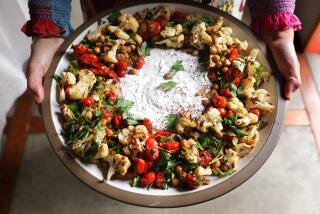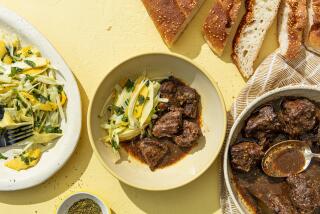Body Needs Some Fat for Energy : Beef Salads That Mix Meat With Fruits, Vegetables Make for Sensible Eating
- Share via
There is a controversy stirring about fat. Is it good or bad for you? Actually fat can be both beneficial and hazardous to your health, depending upon the amount and the type of fat in your diet.
Some fat is needed by the body because it provides about one-third of the body’s energy needs. It supplies a more concentrated form of energy than even carbohydrates and proteins--every 1 gram of fat burns up 9 food calories (about twice the amount for carbohydrates and proteins). What this means is that fats furnish the energy that allows the body to carry out its work, providing acids that aid in growth and reproduction and they do so in about half the time it would take for carbohydrates and proteins to perform the same tasks.
Two Categories of Fats
Basically, fats can be classified into two categories: saturated, which are almost always solid at room temperature and generally originate from animal fat; and unsaturated, which are soft or liquid at room temperature and generally originate from plants. As a rule, almost all of the fats used regularly in our diets are digested and absorbed into the body although unsaturated fats with a lower melting point are more quickly digested and absorbed.
Other fats, like those generated from animal fats, remain in the body longer and can possibly accumulate in the liver, the main fat processing organ. That’s where the controversy comes in.
How much fat is too much fat and how much of which foods does one eat to reduce the possibility of a build-up? The recommended amount of dietary fat is about 25% to 35% of the total daily calories. And no more than one-third of those fats should be saturated.
That doesn’t mean we have to give up foods like red meat, cheese products and butter completely, though moderation is suggested.
A 3 1/2-ounce beef steak dinner, for instance, including a baked potato with sour cream, a tossed green salad with Roquefort dressing and crusty French bread with butter, could place you well into the 100-grams-of-fat range. One hundred grams of fat amounts to 900 calories, and that is equivalent to just slightly less than 50% of the total daily allotment of fat in the dinner alone. The amount of fat is increased further when tallies for breakfast and dinner are added.
What we suggest here are some beef salads that offer portions of beef steak and roast but combine them with ingredients like fresh fruits and vegetables to make their fat levels acceptable. Summertime Beef Salad, for example, has a low 31 grams of fat per serving while Italian Beef Salad, with the addition of macaroni and mayonnaise, totals 48 grams of fat.
SUMMERTIME BEEF SALAD
1 pound beef steak
1/2 cup plain yogurt
1 tablespoon lemon juice
1 tablespoon honey
1 clove garlic, finely chopped
1/8 teaspoon curry powder
1/8 teaspoon salt
1 cup seedless grapes, sliced in half lengthwise
1 cup julienned jicama
1/2 medium cantaloupe, diced
2 bunches watercress, cleaned and tough stems removed
Trim fat from steak. Broil 4 inches from heat, 5 to 7 minutes per side for rare or to desired doneness. Slice steak across grain into thin slices. Combine yogurt, lemon juice, honey, garlic, curry powder and salt in small bowl.
In larger bowl, combine grapes, jicama and cantaloupe. For each serving, arrange 1/4 of steak slices and 1/4 of fruit mixture on bed of watercress. Serve with yogurt dressing on side. Makes 4 servings.
PER SERVING: 464 calories; 22 gm protein; 25 gm carbohydrate; 31 gm fat; 79 mg sodium; 185 mg potassium.
USRDA
Protein 34% Riboflavin 17% Vitamin A 56% Niacin 27% Vitamin C 71% Calcium 08% Thiamine 11% Iron 21% BEEF AND BLACK-EYED PEA SALAD
1 pound beef steak, cut 3/4-inch thick
2/3 cup prepared red wine vinegar and oil dressing
1 clove garlic, minced
1/2 teaspoon dried oregano leaves
1/2 teaspoon salt
1 (16-ounce) can black-eyed peas, drained and rinsed
1/2 medium cucumber, peeled, halved, seeded and thinly sliced
1/4 cup chopped onion
4 cups spinach leaves
2 pita bread loaves, warmed
Partially freeze steak until firm and slice diagonally across grain into 1/8-inch thick slices. Combine 1/3 cup dressing, garlic, oregano and salt. Place beef strips in plastic bag or baking dish. Pour marinade over strips, stirring to coat. Tie bag securely or cover dish and marinate in refrigerator 1 hour.
Combine remaining dressing, black-eyed peas, cucumber and onion. Set aside. Arrange spinach on serving platter. Drain marinade from pea mixture and set marinade aside.
Spoon vegetable mixture into center of platter. Quickly cook beef strips, about 1/3 at a time, in large skillet over medium-high heat, 3 to 4 minutes. Arrange beef around outer edge of vegetable mixture. Serve immediately. Serve with reserved marinade and pita bread. Makes 4 servings.
PER SERVING: 578 calories; 32 gm protein; 29 gm carbohydrate; 38 gm fat; 1,478 mg sodium; 1,103 mg potassium.
USRDA
Protein 49% Riboflavin 24% Vitamin A 91% Niacin 33% Vitamin C 62% Calcium 11% Thiamine 21% Iron 41% LEMON AND HONEY BEEF SALAD
1 (3-pound) beef roast
1/3 cup lemon juice
3 tablespoons honey
4 cloves garlic, minced
3/4 teaspoon salt
1/2 teaspoon red pepper flakes
1/4 cup oil
6 cups cooked rice
2 medium sweet red peppers, cut into thin strips
1 cup sliced green onions
Place roast, fat side up, in shallow open roasting pan. Insert meat thermometer so that bulb is centered in thickest part of roast. Roast at 325 degrees until thermometer registers 140 degrees for rare, 160 degrees for medium and 170 degrees for well done. Allow 26 to 32 minutes per pound for rare, 34 to 48 minutes for medium and 40 to 42 minutes for well done. (Remove roast from oven when thermometer registers 5 degrees below temperature of desired doneness as roasts usually continue to cook after removal from oven.) Allow roast to rest in warm place 15 to 20 minutes before carving.
Slice roast across grain into thin slices, then cut each slice into 1 1/2-inch pieces. Combine lemon juice, honey, garlic, salt and red pepper flakes in bowl. Add beef to mixture and toss to coat well. Cover and refrigerate 1/2 hour. Stir oil into rice. Stir in beef, red peppers and green onions. Cover and refrigerate at least 2 hours but no longer than 24 hours. Makes 12 servings.
PER SERVING: 475 calories; 20 gm protein; 24 gm carbohydrate; 33 gm fat; 469 mg sodium; 368 mg potassium.
USRDA
Protein 30% Riboflavin 11% Vitamin A 02% Niacin 26% Vitamin C 35% Calcium 02% Thiamine 12% Iron 19% LEMON-BEEF SALAD
1/4 cup lemon juice
2 tablespoons water
2 tablespoons sugar
1 teaspoon poppy seeds
1/4 teaspoon salt
2 cups cooked roast beef strips
1 cup sliced mushrooms
2/3 cup plain yogurt
1 teaspoon Dijon mustard
1 tomato, cut in wedges
4 small artichokes, halved, cooked
1 head red leaf lettuce
Combine lemon juice, water, sugar, poppy seeds and salt in saucepan. Heat to boiling, reduce heat and cover. Simmer 15 minutes and cool. Combine lemon mixture, beef and mushrooms in bowl. Cover and refrigerate at least 3 hours, but no longer than 24 hours.
Drain beef mixture, reserve 3 tablespoons marinade. Stir reserved marinade into yogurt. Stir in mustard. Arrange beef, mushrooms, tomato and artichokes on bed of lettuce. Serve dressing separately. Makes 4 servings.
PER SERVING: 607 calories; 34 gm protein; 31 gm carbohydrate; 43 gm fat; 273 mg sodium; 1,190 mg potassium.
USRDA
Protein 52% Riboflavin 30% Vitamin A 55% Niacin 33% Vitamin C 79% Calcium 22% Thiamine 18% Iron 39% BEEF TABBOULEH SALAD
2 medium tomatoes, peeled, seeded and chopped
2 tablespoons bulgur
1 1/2 cups coarsely chopped, cooked lean beef
1/3 cup chopped parsley
1/4 cup finely chopped onion
2 tablespoons lemon juice
1 tablespoon finely chopped mint
1/4 teaspoon salt
1/2 teaspoon black pepper
1 small cucumber
6 medium Boston lettuce leaves
Combine tomatoes and bulgur in small bowl. Let stand 1 hour or until bulgur is softened. Combine cooked beef, parsley, onion, lemon juice, mint, salt and pepper in bowl. Cover and refrigerate.
Peel cucumber and cut into 8 thin sticks, each about 2 inches long. Combine beef and bulgur mixtures. Arrange 3 lettuce leaves on each plate. Spoon equal amounts of beef salad on each. Garnish with cucumber sticks. Makes 2 servings.
PER SERVING: 548 calories; 28 gm protein; 22 gm carbohydrate; 39 gm fat; 327 mg sodium; 885 mg potassium.
USRDA
Protein 43% Riboflavin 20% Vitamin A 49% Niacin 28% Vitamin C 111% Calcium 09% Thiamine 15% Iron 33% ITALIAN BEEF SALAD
3 small zucchini
3 cups julienne strips cooked beef
3 cups cooked elbow macaroni
1/4 cup sliced green onions
2 teaspoons salt
1/8 teaspoon black pepper
3/4 cup mayonnaise
1/4 cup wine vinegar
1 teaspoon dried basil leaves
1/8 teaspoon garlic powder
16 cherry tomatoes, halved
1/4 cup snipped parsley
Quarter zucchini lengthwise and cut in 1-inch pieces. Add to bowl with beef strips, macaroni and green onions. Sprinkle with salt and pepper and mix well. Combine mayonnaise, wine vinegar, basil and garlic powder and stir into meat mixture. Fold in tomatoes and parsley. Cover and chill in refrigerator 2 or more hours. Makes 6 servings.
PER SERVING: 609 calories; 20 gm protein; 24 gm carbohydrate; 48 gm fat; 906 mg sodium; 355 mg potassium.
USRDA
Protein 30% Riboflavin 14% Vitamin A 17% Niacin 20% Vitamin C 33% Calcium 04% Thiamine 13% Iron 19%
More to Read
Eat your way across L.A.
Get our weekly Tasting Notes newsletter for reviews, news and more.
You may occasionally receive promotional content from the Los Angeles Times.










